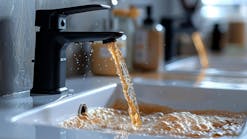Powered by SimpleLab
undefined
Today’s consumers know more about the contaminants in their water than ever before, sometimes even more than the company that sold them a filter. This is because a sea change in consumer data has been quietly reshaping the environmental health industry. People at home and work increasingly expect and depend on professional, richly detailed data to inform and evaluate their purchasing decisions. Fires in California, news about lead in baby formula and known harmful chemicals in cleaning products—these are all disparate problems that have inspired a new generation of data-driven consumerism in health, especially water quality.
The lack of personalized water quality data could be negatively affecting filtration companies and their customers as mass-market adoption of cloud services, innovation in direct-to-consumer marketing, and modern statistical methods are beginning to impact the water quality industry.
Catching Up with the Consumers
After decades of “free” water tests and inadequate over-the-counter in-home water testing “strips”, residents are now ignoring these and taking ownership of their water quality much in the same way they now compare and order groceries online. The sales tactic of offering TDS (total dissolved solids) water tests as a definitive method for measuring water quality is becoming obsolete.
Dealers may or may not be aware that their customers are becoming more sophisticated with respect to water quality data and laboratory analysis. Specifically, they want to know the equipment they purchase will effectively remove contaminants known to be in their drinking water. Product “certifications” are great, but they can also be confusing, especially when many companies make claims without any scientific evidence to back it up.
To remain competitive, filtration companies need access to the same water quality data that treatment system providers use. They need timely data that identifies which customers most need their products; they need to tailor their messaging to address the specific contaminant concerns of their customers; and they need hyperlocal data and rapid laboratory test results on thousands of reported contaminants so they can improve and extend the efficacy of their filtration media.
A Tool for Timely Access
When it comes to working with filtration dealers, SimpleLab, a science and health services company, provides an easy choice for setting up an account to manage water testing, reporting and data. The end result is water filter customers who have timely access to water quality reports they can understand that are filled with useful health information and details on which filtration methods work best for their local situation.
Water Quality Search, the latest solution by SimpleLab, is a cloud-based data service for water industry professionals. Dealers can search and analyze local water quality data in a more granular way than ever before, and with the push of a button, detailed reports can be generated on household water quality down to the customer’s street address. Updates to the data and the system features are systematically rolled out weekly.
As it relates to marketing and product development teams, filtration companies are learning that they can no longer afford to promote one-size-fits-all products throughout all 50 states. They should now adapt their marketing strategies and product lineups to sync with the ever-changing lists of reported contaminants in each and every market they serve.



